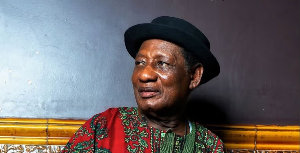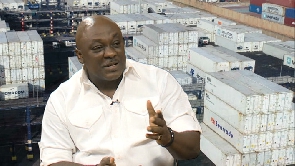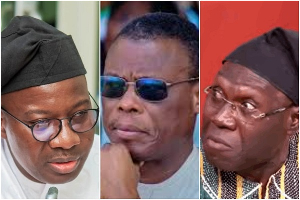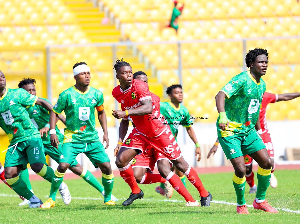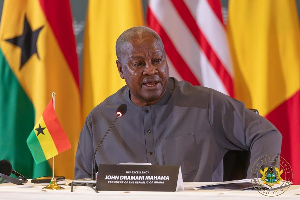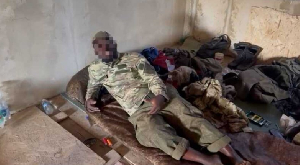Among the many clichés and platitudes spawned by COVID-19, perhaps the most apt is the phrase, “turned the world upside down." It describes almost literally what the world has lived through over the past half-year.
We have seen situations that we would have described as too bizarre if they had appeared in a work of futuristic fiction.
Would you have believed if a prophet had told you that a day would come when every church building in Ghana would stand silent and empty?
Of course, not; neither would you have agreed to the same thing about beer bars and pubs.
The year 2020 will go down in history for many reasons; one of them is for the fact that for a period during the near-global lockdown, humanity lived without culture – defined as “the knowledge, beliefs, arts, laws, customs, capabilities, and habits” of various peoples and groups.
Throughout the world, galleries, shops, theatres, law courts, mosques, parliaments, and cathedrals and churches were all closed, as were pubs, spots restaurants and clubs.
For the first time in history, no sports and games were played anywhere in the world and the Olympic Games have been postponed for the first time in peacetime.
In Ghana, the most monumental impact was the absence of funerals, an activity that ranks as the most common weekend event in the country by a wide mark.
However, even in our darkest moment of self-enforced imprisonment and inactivity, politics was never far from the fore.
By the way, this is a near-universal phenomenon; all over the world, politicians can’t seem to hold off from playing their game for too long.
In many countries, the response to the virus was often dictated by political and ideological considerations.
For example, critics say that President Trump and his Brazilian counterpart, Jair Bolsonaro, responded ideologically to the pandemic instead of taking the advice of their own medical scientists.
In Africa, Burundi held elections under President Pierre Nkurunziza, who was an avowed COVID-19 denier.
He refused to take WHO advice and did not allow in election and health monitors during the elections which were held without any regard to COVID-19 protocols.
He died of the disease he had treated with disdain. Mali held a referendum and Malawi organized a rerun of its presidential elections just last week.
These were divisive and partisan activities in the middle of a pandemic.
Meanwhile, politicians in all countries urge their people to come together to fight a common enemy but are unable to put partisan politics on hold while the virus continues to threaten human lives.
In Ghana, the political temperature appeared to reduce slightly in the early days of the virus entering our country but this cool climate did not last.
It was a false thaw, may be produced by fear and uncertainty. The fever returned with a vengeance, especially in the second week of the lockdown when the opposition NDC alleged that the sharing of food to poor people had been politicized.
The NPP denied this but the foot soldiers on both sides, hungry for a political fight, seized the moment and there has been no looking back.
Of course, the question of voter registration, a matter that elsewhere is only an administrative procedure, is always the centre of a political storm in Ghana.
The reason for this lies in the hidden depths of political wisdom to which only our two great parties must be privy.
To us mere mortals, it is a case of unending wonderment why the registration of people must cause so much apprehension.
Do they know something we don’t know?
In Ghana, the NPP and NDC appear determined to prove H. L. Mencken’s cynical view that “under democracy, one party always devotes its chief energies to trying to prove that the other party is unfit to rule - and both commonly succeed, and are right.”
When you think about it, voter registration simply means writing down the names of people who qualify to vote.
The Electoral Commission (EC) has the responsibility to register those people according to the appropriate laws passed by Parliament.
Parliament is made up of politicians from the NPP and the NDC who presumably act in the nation’s best interest.
Therein lies the rub.
The nation’s best interest!
While we, the unsuspecting citizens must believe this to be true, neither side believes this to be true of their opponents.
So, somewhere in their different brains, there must be a little bird continuously reminding them that the other side will cheat.
This is the long and short of the matter.
So, even threatened by the deadliest pandemic we have faced for generations, the two sides could not find a common ground even in Parliament to resolve the question of how the EC could conduct a registration exercise that would be fair and credible, which in turn would lead to election results trusted by all sides.
The reason for this is simple: our politicians have no faith in the system, however, that is defined.
Let us try to unlock that. This wrangling over the electoral register happens every four years in the lead up to elections.
In every instance, the EC and the ruling party speak with one voice while the opposition opposes the EC.
It does not take a genius to work out that the EC, instead of being seen as neutral and independent is perceived to be part of the government.
The independence of the EC must not only be on paper; it must be SEEN to be so.
That independence is at the centre of our democratic culture; once it is seen as tainted, questions arise over the entire structure.
This unfortunate situation has persisted throughout the life of the 4th Republic.
It has been the cause of so much tension and undermines the quality of our democracy by taking the focus from the issues that matter to the people.
Politicians and the media have spent more time discussing the election register than the important fight against the pandemic and the unacceptable socio-economic gap which the lockdown has so mercilessly exposed.
It appears that the only purpose of our politics is to elect people, and there it ends.
In this difficult time, one would think our politicians would come together and put the national interest first, as they profess.
There is no doubt that there are some conviction politicians who are in it to serve the people, but the overall tone of our politics appears to be dictated by those who would rather pick a partisan fight than seek a compromise.
Indeed, there is a fight to be won against an enemy called neither NPP nor NDC.
While COVID-19 stalks the land, let us change the tone and nature of our politics and set our priorities on the right trajectory.
kgapenteng@gmail.com
Opinions of Thursday, 9 July 2020
Columnist: Nana Kwasi Gyan-Apenteng
Politics in the time of COVID-19
Entertainment
